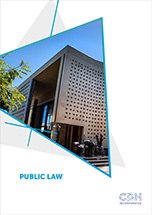Public Law News
More newsTransforming public procurement: A comprehensive analysis of the Draft Public Procurement Bill
The National Council of Provinces’ select committee on finance has made amendments to the Public Procurement Bill (Bill) and aims to have it approved by the National Assembly during the course of thisweek.
Shifting sands: A recent shakeup to the preferential procurement regime in South Africa
Procurement by organs of state is comprehensively regulated; section 217(1) of the Constitution provides that when procuring entities contract for goods or services they must comply with the principles of fairness, equity, transparency, competitiveness, and cost-effectiveness. Despite this, section 217(2) provides that the state may make use of procurement as a policy tool to protect or advance persons, or categories of persons disadvantaged by unfair discrimination. Section 217(3) stipulates that legislation must be enacted to provide a framework for the use of such policy. The enacted legislation is the Preferential Procurement Policy Framework Act, 2000 (PPPFA Act). It sets out the framework for the implementation of a preferential procurement policy.
Do you even have a contract? Public entities and “future financial commitments” under the PFMA
Given the renewed focus on ensuring accountability in government spending, and the enhanced judicial scrutiny of public contracts, clarity from the courts on the meaning and scope of key provisions of the Public Finance Management Act, No 1 of 1999 (PFMA) is most welcome for public and private actors alike. The Supreme Court of Appeal has recently offered such clarity in relation to agreements for goods and services that have multi-year contractual terms.


